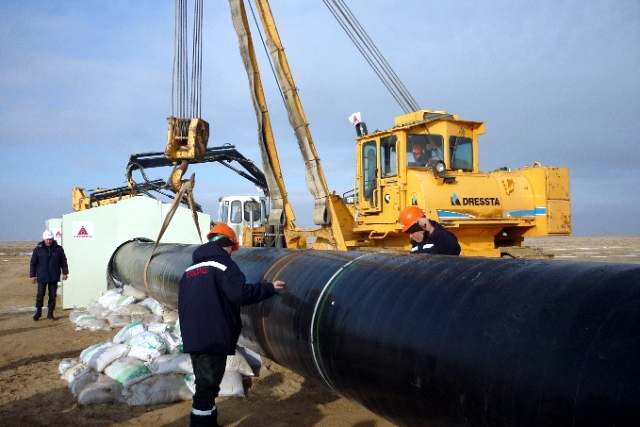Baku, Azerbaijan, June 10
By Elena Kosolapova - Trend: There is no good reason to believe the Trans-Caspian pipeline represents more of a danger to the Caspian Sea than Russian Blue Stream does to the Black Sea, a US expert on Central Asia, Bruce Pannier believes.
Earlier, Russian Foreign Ministry spokesman Alexander Lukashevich said that Western environmental organizations prefer to ignore the potential threats to the Caspian region's ecology, and in the EU reports, saying that the Trans-Caspian pipeline poses no threat to the environment, "politics blatantly dominates over environment."
"The environmental aspect of this issue primarily concerns the Caspian littoral states without any exception. In this regard, all five Caspian states have the voting right," the Russian diplomat said.
Expert Bruce Pannier told Trend that European Commission Vice-President for Energy Union Maros Sefcovic had already addressed that issue by noting the EU had sponsored feasibility studies on the possible ecological consequences that show the Trans-Caspian pipeline would be safe.
The expert noted Russia always brings up the "ecological consequences" when speaking about the Trans-Caspian pipeline. Meanwhile it has constructed a gas pipeline (Blue Stream) across the bottom of the Black Sea, plans to construct at least one more pipeline (Turkish Stream) there, and has also built two pipelines across the bottom of the Baltic Sea. So far there have not been any ecological problems with those existing pipelines. Meanwhile, he stressed, that technical experts have pointed out the section of Blue Stream that runs along the sea bottom is some 396 kilometers while the Trans-Caspian pipeline would be about 250 kilometers and Blue Stream is at a greater depth under the water than the Trans-Caspian pipeline would be.
Moreover, Pannier mentioned that Italian company Saipem which laid the Black Sea section of the Blue Stream pipeline, also built the pipelines from Kazakh Kashagan field to the mainland. The Kashagan pipelines cracked very quickly, polluting the northeast Caspian Sea, and those pipelines are now being totally replaced.
"So if Russia wishes to raise concerns about the Trans-Caspian pipeline then Moscow should recognize the same company that built Blue Stream built the 95-kilometre pipelines from Kashagan. I haven't heard Russia voice any public concerns about Kashagan," Pannier said.
Therefore, the expert believes that certainly the intention of Russian Foreign Ministry spokesman was to pressure Turkmenistan and Azerbaijan and remind them, and the EU, that Russia does not agree with construction of the Trans-Caspian pipeline and will object to and resist attempts to build it.
The expert thinks Lukashevich's statement was expected. He noted that Turkmenistan and Azerbaijan have been actively talking with the European Union about construction of the Trans-Caspian Pipeline for weeks now and European Commission Vice President in charge of Energy Union Maros Sefcovic was in Turkmenistan at the end of April - early May speaking with the Turkmen president about the Trans-Caspian pipeline. Turkmenistan and Azerbaijan have said publicly, several times, they are ready to cooperate in building the Trans-Caspian pipeline.
Moreover there was the well publicized agreement between Turkmenistan and Kazakhstan on demarcation of their maritime Caspian border in May, which many interpreted as Turkmenistan preparing its case that national sectors are de facto, but not de jure, already recognized and so with the cooperation of the only other littoral state directly involved, Azerbaijan, Turkmenistan is free to go ahead with Trans-Caspian pipeline construction.
"Russia has remained quiet through all of this but Moscow was bound to speak up at some point. So I was not surprised at the Russian Foreign Ministry spokesman's comments," Pannier said.
The expert doubts that Trans-Caspian pipeline will be constructed by 2019, when Sefcovic earlier predicted Turkmen gas to the EU.
"Technically it is not difficult but there are Russia's "ecological concerns" that need to be settled and the legal status of the Caspian Sea is still unresolved," Pannier said.
The Trans-Caspian pipeline project is regarded as the optimal option for delivering Turkmen resources to European markets. The project envisages the laying of around 300 kilometers long gas pipeline under the Caspian to the shores of Azerbaijan. Further Turkmen can be transported to Turkey which has mutual borders with European countries.
The project may be implemented as a part of huge Southern Gas Corridor project designed to transport gas from the Caspian region to European countries. The gas to be produced within the second stage of Azerbaijani Shah Deniz field development is designed to open the Southern Gas Corridor.
The negotiations between the EU, Azerbaijan and Turkmenistan on the Trans-Caspian gas pipeline began in September 2011. However Russia and Iran have always spoken against the Trans-Caspian pipeline due to ecological issues during the pipeline's construction. The unresolved status of the Caspian Sea has been regarded as the main factor hindering the implementation of the project.
The official position of Ashgabad regarding the project is that the consent of the countries whose territories are involved into the project is enough to build a pipeline. Azerbaijan has repeatedly expressed readiness to provide its territory, transit facilities and infrastructure for realizing the project.
Earlier the European Commission Vice-President for Energy Union Maros Sefcovic said that Europe intends to find a technical and legal basis for the Turkmen gas supply via Azerbaijan.
Turkmenistan ranks fourth in the world for the volume of natural gas reserve. This is while the reserve of the certain fields such as Galkynysh and Yashlar make up 26.2 trillion cubic meters.
The natural gas production in Turkmenistan exceeded 76 billion cubic meters, while the export of this fuel surpassed 45 billion cubic meters in 2014. The country plans to produce over 80 billion cubic meters of commercial gas in 2015.
Edited by CN
Follow the author on Twitter: @E_Kosolapova






